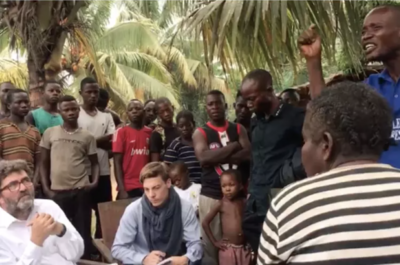RIAO-RDC et al. | 3 April 2024
New revelations in a palm oil scandal in the DRC: Urgent actions need to be taken in the mediation process
To:
Mr. Niels Annen, BMZ State Secretary, Germany
Mrs. Bruins Slot, Minister of Foreign Affairs, Netherlands
Ms. Caroline Gennez, Minister of Development Cooperation, Belgium
Rt Hon Andrew Mitchell MP, Minister of State, Foreign, Commonwealth & Development Office (FCDO), United Kingdom
CC:
Mr. Félix-Antoine Tshisekedi Tshilombo, President of the Democratic Republic of the Congo
Ms. Christiane Rudolph, Chief Sustainability Officer, DEG
Mr. Michael Jongeneel, Chief Executive Officer, FMO
Mr. Joris Totté, Chief Executive Officer, BIO
Mr. Nick O’Donohoe CMG, Chief Executive Officer, BII
Mr. Michael Windfuhr, Independent Expert Panel, Independent Complaints Mechanism
We, the undersigned non-governmental organisations, are writing to bring to your attention critical concerns with the ongoing mediation process of the Independent Complaints Mechanism (ICM) of the German and Dutch development banks (DEG and FMO) in the Democratic Republic of Congo (DRC), pertaining specifically to the operations of the company Plantations et Huileries du Congo (PHC) and its impact on local communities. We request that you take urgent actions to pause the mediation process while these concerns are being addressed.
The objective of the mediation is to address a complaint from communities in the areas of Lokutu and Boteka, raising "concerns about the legitimacy of the land titles of the plantation and alleged deprivation of the use of customary land, physical and human rights abuses by PHC security guards and police, and the lack of information and legal support of communities in negotiations with PHC".
We are deeply concerned, however, that the ICM mediation process is coercing the communities into foregoing their rights to their territories and accepting PHC's ongoing occupation of their lands without the time, resources, security and legal support required to adequately defend their interests.
Our concerns are based, most recently, on the mediator's report from the last mediation sessions in January and February of this year, communications with RIAO-RDC (the organisation mandated to represent the communities in the mediation process), and new information that has come to light through court cases in the US and Mauritius which suggest that PHC's new owners are engaging in serious financial fraud and have deceived the communities about the legal status of PHC's land titles.
We are also alarmed to have only discovered recently, through court documents made public in the US, that the DEG, FMO and BIO and the Emerging Africa Infrastructure Fund had made the return of over half of the lands claimed by PHC in its historical concessions a condition for the US$49 million loan they provided to PHC in 2015. This information was concealed from civil society organisations and parliamentarians that have engaged in good faith with these development finance institutions (DFIs) since 2015. We are shocked that these DFIs did not insist on a clear return of these lands to the communities, particularly as part of the restructuring process that took place in 2020 when ownership of PHC was transferred to a Mauritius-based private equity fund. We are equally shocked that this information has been withheld from the ICM mediation process.
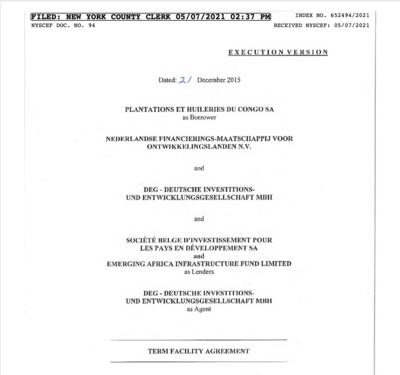 The "Executive Version" of the loan agreement between the DFIs and PHCAccording to the "Executive Version" of the loan agreement between the DFIs and PHC, the loan was conditional on PHC providing the following documents:
The "Executive Version" of the loan agreement between the DFIs and PHCAccording to the "Executive Version" of the loan agreement between the DFIs and PHC, the loan was conditional on PHC providing the following documents: • legal opinions "confirming that the First Utilisation Concessions and the Other Lokutu/Boteka Concessions are valid and have been signed by the appropriate authorities and that none have any encumbrances against them or are the subject of any disputes”
• “executed copies of each Concession Mortgage” for “those Concessions in respect of all areas of the Boteka/Lokutu concessions which are planted or will be planted by the Borrower in the 5 year period following the date of this Agreement”
• a document elaborating the "strategy for the Other Boteka/Lokutu Concessions (verified by an external expert and costs to be borne by the Borrower) satisfactory to the Lenders identifying those concessions which the Borrower wants to retain and those the Borrower wants to return to the competent DRC authorities (taking into account FESA results and RSPO Principles and Criteria and IFC Performance Standards, including but not limited to ecological and socioeconomic characteristic of the respective areas) together with information on the process and manner in which the Borrower will return such concessions to the DRC authorities all in accordance with the ESAP or as the Lenders may otherwise require.”
• “evidence satisfactory to the Lenders that the Borrower has implemented the strategy for the Other Boteka/Lokutu Concessions as described in paragraph 7 of Schedule 1, Part 2 including evidence that the Borrower has (i) fragmented all the titles the Borrower intends to retain and has submitted them to the competent DRC authority for signature and (ii) taken all necessary steps to dispose of any unwanted titles.”
• a "Study on Land Legacy Issues”
• a "Land Policy, approved by ESG [Environmental Social Governance] Board Committee and Lenders, based on the results of the Study on Land Legacy Issues”
• a "Land Management Plan (LMP) to implement the Land Policy, approved by ESG Board Committee and Lenders, to include current and planned land use by the project, further extension potential and expansion plans, existing land uses and approach to handling potential land use conflicts (including any boundary disputes arising from Action #3.4 and #3.5) and ecological land issues (a. o. arising from Action #3.2); company approach to accessing land for company activities as defined in the Land Acquisition Policy (both newly acquired and land currently used by communities), i.e. plantable areas and plantable reserves, including timeframes, consultation requirements, potential compensation or mitigation measures, permitted community activities.”
Given the human rights obligations and various international commitments of the governments responsible for these DFIs, the failure to effectively impose these conditions and make the documents available to the communities constitute violations that have already caused serious harm to the communities. Copies of these documents should now be immediately made public and provided to the affected communities, as well as to all participants in the ICM mediation process. Moreover, the DFIs and their governments should take immediate action to address the blatant violations of the conditions of the loan agreement with PHC.
As is clear from the mediator's report on the most recent mediation sessions of the ICM, the process is proceeding on the basis of a set of old land concessions (certificats d'enregistrement) that date back to the colonial period. As a condition of the 2015 loan agreement with the DFIs, PHC fragmented these concessions into numerous smaller concessions covering only those lands that "are planted or will be planted by [PHC] in the 5 year period following the date of the Agreement". The agreement specified that the remaining area, 7,477.11 hectares in Boteka, 8,000 ha in Yaligimba and 43,295.69 hectares in Lokutu-- a total area that is well over half of the entire area claimed by PHC-- was to be returned to the DRC authorities. This enormous, 58,773 ha area of land has never been returned to the DRC authorities or the affected communities.
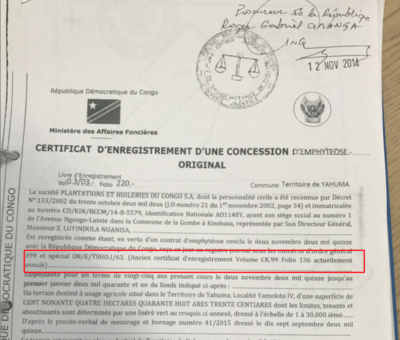 Example of one of the fragmented concessions, in which the old title is deemed to have been cancelled (in this case the cancelled concession, CK 99 - folio 136, covers 46,200 ha in Lokutu)In 2017, our coalition of civil society organisations was allowed to visit the London offices of Feronia Inc (at the time the owner of PHC) and photograph the complete set of PHC's land documents. We subsequently commissioned a legal analysis of the documents. For each of the new fragmented concessions awarded to PHC in 2015, there is a letter from the DRC Ministry of Lands, signed by the Procureur Général de la République, stating that the former concessions, from which the concessions were fragmented, were annulled. We were also able to clearly ascertain that the old concessions dating back to the colonial era were deeply flawed, and not in conformity with DRC legislation. The old Boteka concessions were also to expire by 2019.
Example of one of the fragmented concessions, in which the old title is deemed to have been cancelled (in this case the cancelled concession, CK 99 - folio 136, covers 46,200 ha in Lokutu)In 2017, our coalition of civil society organisations was allowed to visit the London offices of Feronia Inc (at the time the owner of PHC) and photograph the complete set of PHC's land documents. We subsequently commissioned a legal analysis of the documents. For each of the new fragmented concessions awarded to PHC in 2015, there is a letter from the DRC Ministry of Lands, signed by the Procureur Général de la République, stating that the former concessions, from which the concessions were fragmented, were annulled. We were also able to clearly ascertain that the old concessions dating back to the colonial era were deeply flawed, and not in conformity with DRC legislation. The old Boteka concessions were also to expire by 2019.In 2017, we alerted Kuramo Capital, the current owners of PHC, about our concerns with the legality of PHC's land documents when the company was first considering an investment in PHC (via Feronia Inc.). In an email response on 13 November 2017, in which the DFIs were copied, the CEO of Kuramo Capital, Wale Adeosun, stated that they had carried out "extensive due diligence" and that their "assessments found that the Company does have valid land title, which your colleagues viewed and photographed at the Company’s London office in February." He further stated: "We understand that the Company’s decision to fragment its existing legal titles into smaller areas was done... to ensure the Company only provided security for its DFI Loan on land on which it operates, as it felt it was not right to secure the loan on land which contained villages and community infrastructure; and to enable the Company to potentially relinquish land which it won’t use in the future."
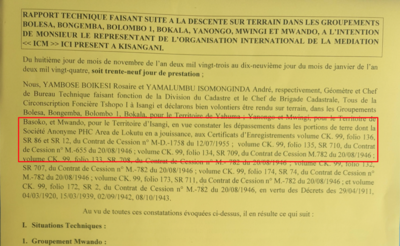 Report submitted to the mediation process showing that PHC's land claims in Lokutu are based on the cancelled land concession, including those corresponding to CK99 - folio 136.In the most recent mediation sessions, PHC stated, without providing any documented evidence, that these fragmented land titles are not valid and that its land claims are based on the old titles, which, according to the company, remain valid, again without providing any evidence. It is important to note that PHC refused to provide copies of their land documents to the mixed commissions that were formed under the ICM process to investigate whether PHC was violating the boundaries of its concessions and, in the case of Lokutu, whether it had followed due process in acquiring these concessions. In Lokutu, the mediation team was thus obliged to request copies of these titles from the Conservateur des titres immobiliers, who, then, requested copies from PHC, indicating that the government itself does not have copies of these titles. In a letter to the Conservateur des titres immobiliers dated 13 November 2023, the Director General of PHC stated that she "refused" to provide copies of PHC's land titles to the mediation team because they could be "used in an abusive manner".
Report submitted to the mediation process showing that PHC's land claims in Lokutu are based on the cancelled land concession, including those corresponding to CK99 - folio 136.In the most recent mediation sessions, PHC stated, without providing any documented evidence, that these fragmented land titles are not valid and that its land claims are based on the old titles, which, according to the company, remain valid, again without providing any evidence. It is important to note that PHC refused to provide copies of their land documents to the mixed commissions that were formed under the ICM process to investigate whether PHC was violating the boundaries of its concessions and, in the case of Lokutu, whether it had followed due process in acquiring these concessions. In Lokutu, the mediation team was thus obliged to request copies of these titles from the Conservateur des titres immobiliers, who, then, requested copies from PHC, indicating that the government itself does not have copies of these titles. In a letter to the Conservateur des titres immobiliers dated 13 November 2023, the Director General of PHC stated that she "refused" to provide copies of PHC's land titles to the mediation team because they could be "used in an abusive manner". The ICM mediation has been ongoing for five years now, and has yet to make any advance in addressing the most basic elements of the complaint from communities. These are: the "legitimacy of the land titles of the plantation" and "the lack of information and legal support of communities in negotiations with PHC". The communities were given a two month deadline and US$100 each after the conclusion of the last sessions to state what they "request" from PHC in "compensation" in exchange for accepting "the legitimacy of the land title of PHC from 2015".
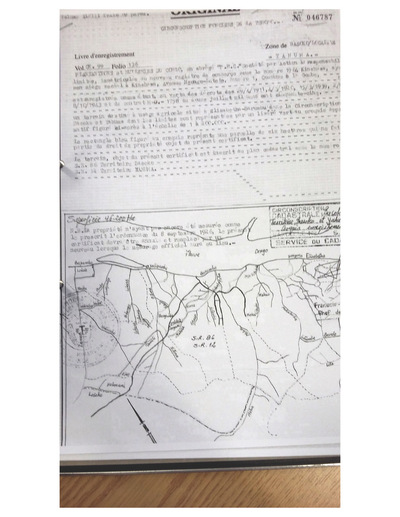 Document from the old, 46,200 ha concession CK 99-folio136, issued when PHC was still owned by Unilever.Moreover, the communities are completely in the dark about the financial situation of the company and have not been provided with any recent financial reports from the company. This is all the more serious given that PHC's directors and shareholders are in two major legal battles, one of which accuses the current directors and upper management of using PHC as a vehicle for fraud and money laundering. In fact, one of the lawsuits alleges that overdue audited financial statements from 2020 and 2021 have still not been provided to the board of PHC’s holding company.
Document from the old, 46,200 ha concession CK 99-folio136, issued when PHC was still owned by Unilever.Moreover, the communities are completely in the dark about the financial situation of the company and have not been provided with any recent financial reports from the company. This is all the more serious given that PHC's directors and shareholders are in two major legal battles, one of which accuses the current directors and upper management of using PHC as a vehicle for fraud and money laundering. In fact, one of the lawsuits alleges that overdue audited financial statements from 2020 and 2021 have still not been provided to the board of PHC’s holding company.As detailed above, we see a high risk that through the mediation process the communities are pressured, including by a lack of time, a lack of capacities, threats of violence by company security guards and the national police and a lack of information, to agree on unjust terms that have substantive detrimental long-term outcomes – especially related to their land rights.
In light of these pressing issues, we demand that you take urgent action to ensure an immediate pause on the ICM mediation process. During this pause, the affected communities must be granted access to PHC's financial statements and reports. They must also be granted full access to all of PHC's land documents, including copies of all documents produced by PHC as a condition for its 2015 loan from the DFIs. They must also be provided with resources to conduct an independent audit of the financial records and an independent legal analysis of the land documents before the ICM mediation proceeds any further. The ICM panel should provide an explanation as to why this information has not been previously provided to the communities.
The DFIs demanded this kind of transparency and documentation when they provided a loan to PHC in 2015. They and the governments they are responsible to, must, at a minimum, ensure the same for the communities who have endured the consequences of this company's occupation of their lands for over a century now, an occupation that has been financed by European development banks. There can be no fair and effective mediation process without it.
Thank you for your attention to this urgent matter.
Sincerely,
Corner House - UK
Entraide et Fraternité - Belgium
FIAN-Belgium
FIAN- Germany
Global Legal Action Network
GRAIN
Institute of Sustainable Agriculture (ISA) - Liberia
Jogbar United Women Empowerment and Development Organization (JUWEDO) - Liberia
Milieudefensie - Netherlands
Oakland Institute - US
Rettet den Regenwald - Germany
RIAO-RDC - DR Congo
Struggle to Economize Future Environment (SEFE) - Cameroon
Syndicat des paysans riverains de la Socapalm (Synaparcam) - Cameroon
World Rainforest Movement


